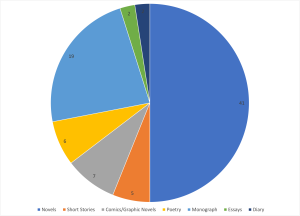Just a little late this week.
Column: “In Defense of Obscure Words,” by Will Self
So, there’s a level on which this can be read as— and maybe is— Will Self being a fusty old man (despite not being particularly old) complaining about the decline of civilization. But while I disagree with the declinism of his argument— by which I mean I don’t believe that the situation he is describing is anything new— I can’t help but sympathize with him just a little bit. Essentially, his point is that people don’t want to be challenged in what they read, what they watch, or what they hear, because of what he sees as an increasingly “risk-averse” culture— we don’t want to risk being wrong, or not understanding something. This is a bad thing because learning and developing as people depends on engaging with “difficult” stuff; the most appalling thing in the piece for me was the story about his daughter’s teacher telling her the end of Great Expectations, “on the grounds that, having read the little gobbets served up for interpretation, according to her pedagogue there was no necessity for her to try and choke down the whole indigestible meal.” The assumption being that the only reason to read Great Expectations is so you know what happens in it— the reading itself, the act of picking through the prose and looking up all the obsolete words, has no value at all. This is an assumption I see made about education in general all the time: that it is about information, about shoving as much data into one’s brain as possible, rather than about skills that allow one to use the information one has.
Article: “Six Degrees of Aggregation” by Michael Shapiro
This is quite a long piece, and it takes a while to get where it’s going, but it ends up being something quite different, and more interesting, than you might initially think. It’s about the history of the Huffington Post, from the very beginning to its purchase by AOL. The argument is that, almost from the beginning, the idea behind the site was not so much to be a source for news, but a kind of platform for interaction among readers of the news. As one of the site’s employees puts it: they don’t want to lead the dinner conversation, they want to be the table around which the conversation happens. Shapiro connects his history of the Huffington Post with the Six Degrees of Separation theory (and there is much more substance to this connection than you might expect), suggesting that the strength of the site is not the information it provides (which is, most of the time, available first somewhere else), but its capacity to prompt comments and conversation among users, creating “weak ties” among them.
Video: “Zero Dark Thirty” by Aesop Rock
Aesop Rock has a new album out in July. This is the first single. In the video, he looks like someone in an asylum, surrounded by sights and forces invisible to everyone else, and describing them in a language that only he understands— but so compellingly that you doubt that he is the crazy one. As such, it could really be the video for every Aesop Rock song ever, because that strikes me as a reasonable description of what he does. You can also download/stream the song here: http://soundcloud.com/rhymesayers/04-zero-dark-thirty
Song: “It’s All Okay (Active Child Remix)” by Julia Stone
I don’t know anything at all about Julia Stone, but basically this sounds like a new Active Child song with female vocals. I’m in.


